Key takeaways:
- NaNoWriMo challenges not only test writing endurance but also require time management and community support to overcome obstacles.
- Setting realistic goals and developing daily writing habits are crucial for maintaining motivation and cultivating creativity during the writing process.
- Embracing reflections on both struggles and triumphs enhances the writing journey, fostering deeper connections with fellow writers and reigniting passion for storytelling.
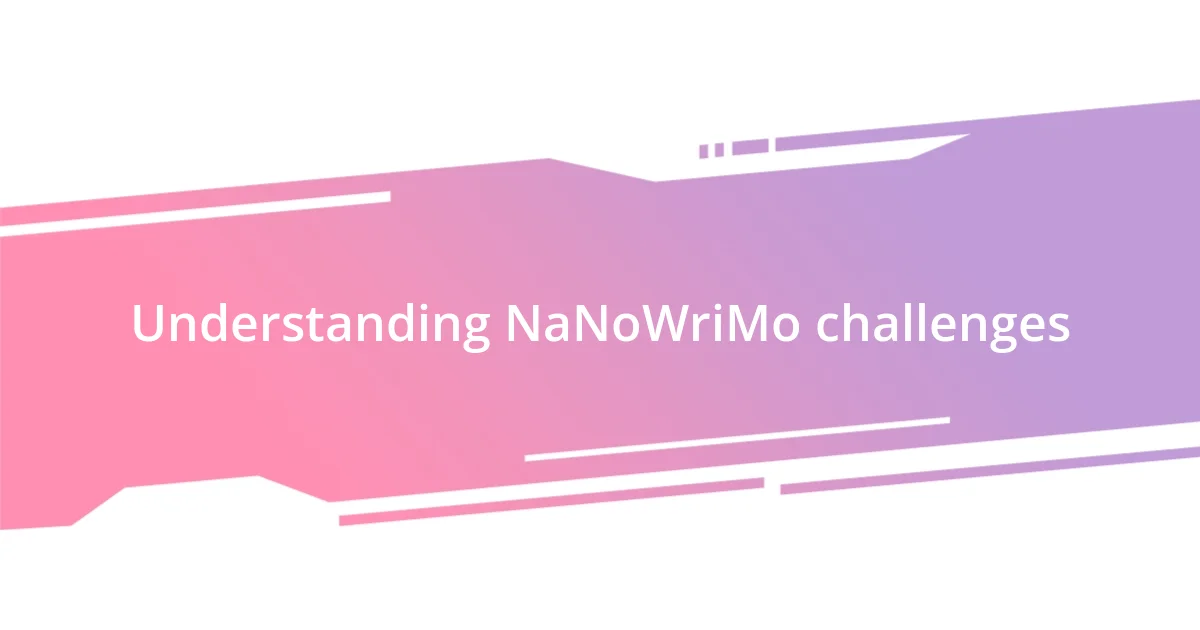
Understanding NaNoWriMo challenges
As I embarked on my first NaNoWriMo, I quickly learned that the biggest challenge isn’t just about writing 50,000 words. It’s about carving out time in your busy life to dedicate to a passion project. How often do we let our dreams take a backseat to everyday responsibilities?
The pressure can feel overwhelming at times. I remember a day when I sat staring at the blank screen, just a few words short of my daily goal. It was frustrating, but that moment taught me the power of perseverance. What happens when we confront these challenges head-on? We uncover our true strength and creativity.
One of the most fascinating aspects of NaNoWriMo is the community that emerges during this literary sprint. Sharing triumphs and setbacks with fellow writers creates an emotional bond that helps us push through the toughest days. Have you ever felt the rush of excitement from a pep talk shared among writers? I can still recall the joy during a local meet-up, where inspiring stories and laughter reignited my motivation.

Setting realistic writing goals
Setting realistic writing goals is crucial to surviving the NaNoWriMo whirlwind. I’ve often found myself overly ambitious, aiming to write 2,500 words a day, only to face the reality of my schedule. This year, I decided to break it down into smaller chunks, and it made a world of difference. Aiming for 1,000 words felt more approachable, allowing me to savor the process rather than rush through it.
Consider these tips when setting your writing goals:
- Assess your current obligations: Take a moment to reflect on your daily routine. What time do you realistically have for writing?
- Start small and build up: If you’re new to writing or NaNoWriMo, begin with a manageable word count, like 500 or 750 words a day.
- Include breaks: It’s essential to recharge. Plan short breaks to refresh your mind, as I learned the hard way when my creativity hit a wall.
- Stay flexible: Life happens, and while it’s great to have a target, being adaptable will keep you motivated.
In my experience, crafting playful, achievable goals transformed my writing. One day, after reaching my target during an unexpectedly quiet afternoon, I felt a wave of joy. It wasn’t just about hitting numbers; it was about enjoying the journey and fostering creativity.
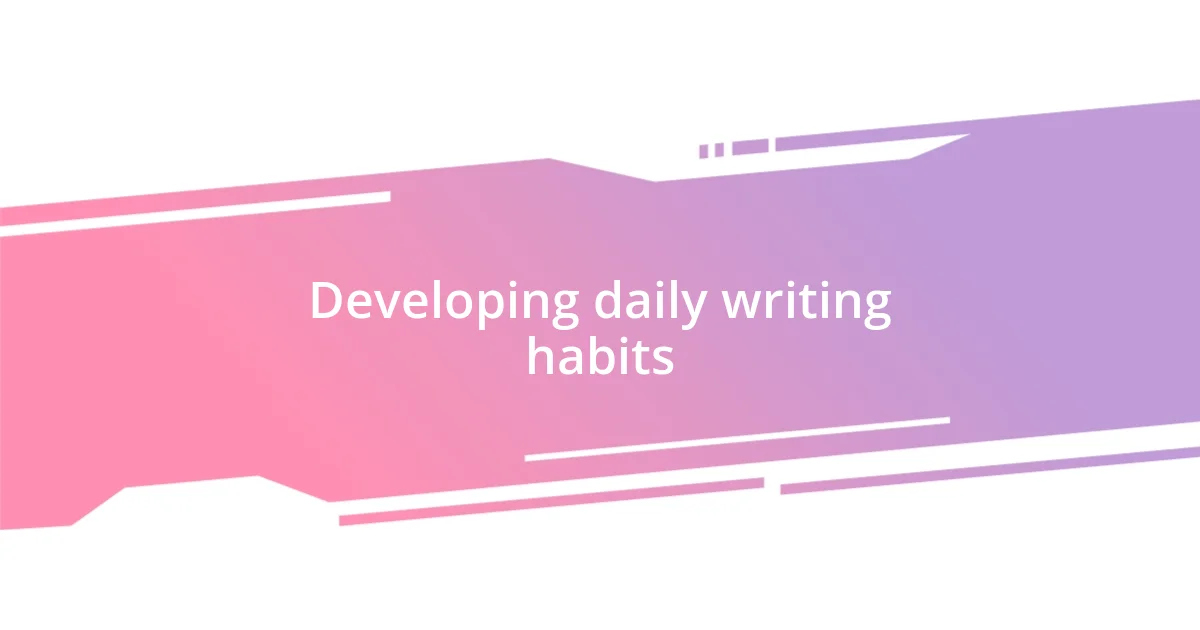
Developing daily writing habits
Developing a daily writing habit can transform the way you approach NaNoWriMo. Early on, I realized that consistency is just as important as word count. I started designating a specific time each day for writing, treating it like an important appointment. It took some time, but soon my brain learned to expect this dedicated space for creativity.
One memorable day, I found myself writing during my morning coffee ritual. It was peaceful, and the words flowed effortlessly. It struck me how establishing a routine not only made writing a habit but also infused a sense of anticipation into my day. How often do we overlook these small moments that can be magical? Embracing this daily practice unlocked a newfound appreciation for both my writing and my surroundings.
As I faced the daily struggle with motivation, I discovered the power of environment. Setting up a cozy writing nook that brought me joy became essential. I adorned it with inspiring quotes and colorful artwork. Whenever I sat there, I felt a jolt of creativity. How can your space influence your writing habits? I’d say your environment can either be a hindrance or a sanctuary, so choose wisely to cultivate inspiration.
| Tips for Developing Daily Writing Habits | My Personal Experience |
|---|---|
| Establish a specific writing time | This became my daily appointment, signaling my brain to get ready. |
| Create a comfortable writing environment | I transformed my space into a sanctuary filled with inspiration. |
| Set achievable daily goals | By aiming for smaller targets, I found joy in the journey rather than stress. |

Overcoming writer’s block techniques
Writing often feels like a rollercoaster ride, with writer’s block showing up as an uninvited guest. When I hit one of those daunting walls, I’ve learned to change my perspective. I remember one evening staring at a blank screen, feeling stuck, when I decided to switch my focus entirely. Instead of writing, I jotted down random ideas and notes about my characters. Lo and behold, that act of exploration freed my mind, sparking the creativity I thought was lost.
Sometimes, shifting your environment can work wonders. I once took my laptop to a local café, and the lively ambiance transformed my mindset. The background chatter and the aroma of freshly brewed coffee ignited my inspiration. Have you ever noticed how a change of scenery can uplift your mood? I’ve found that simply relocating can shake off that heavy fog of indecision, paving the way for new thoughts to flow.
There are also days when writing is harder than usual, and that’s okay. During one particularly frustrating session, I adopted a technique called “freewriting.” I set a timer for ten minutes and allowed myself to write without worrying about grammar or coherence. The result? A messy but liberating exploration of ideas! It reminded me that sometimes, the act of just putting words down can revive the spark. It’s in those unfiltered moments that I often stumble upon gems to expand upon later. How do you push through when the words seem stuck? Embrace those raw, messy thoughts; they just might lead you to clarity.
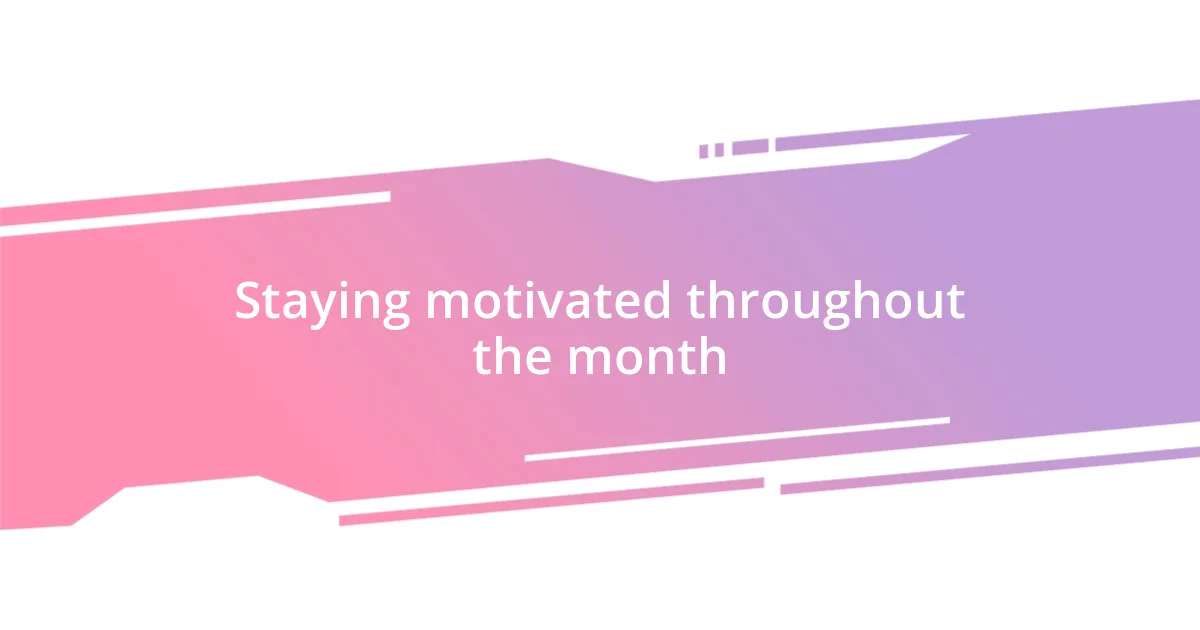
Staying motivated throughout the month
I remember reaching the midpoint of NaNoWriMo, and that’s when motivation often starts to wane. To combat this, I made a habit of celebrating small victories. Every time I reached a milestone—be it 10,000 words or just a particularly well-written paragraph—I treated myself to a little reward, like my favorite snack or a quick episode of a beloved show. Those tiny celebrations recharged my spirits and made the writing journey feel worthwhile.
Connection with fellow writers can also serve as a powerful motivator. I found joining online forums and local writing groups invaluable. Sharing my struggles and victories with others who were on the same path reminded me that I wasn’t alone in my challenges. This sense of community made me feel accountable, and knowing someone else was rooting for me often pushed me to write just a few more words when I wanted to quit. Have you ever felt that camaraderie can spark creativity? I certainly have, and it makes all the difference.
Finally, I learned to embrace the ebb and flow of my motivation levels. There were days when writing felt effortless, and I was in a flow state, like I was channeling my ideas directly onto the page. On other days, I struggled, and that was okay too. I chose to allow myself those breaks, guilt-free. Taking a walk, journaling, or even indulging in a good book often led to fresh insights or renewed motivation. Have you noticed that stepping away can sometimes invite inspiration back? It’s a gentle reminder that rest is not a setback; it’s part of the creative cycle.
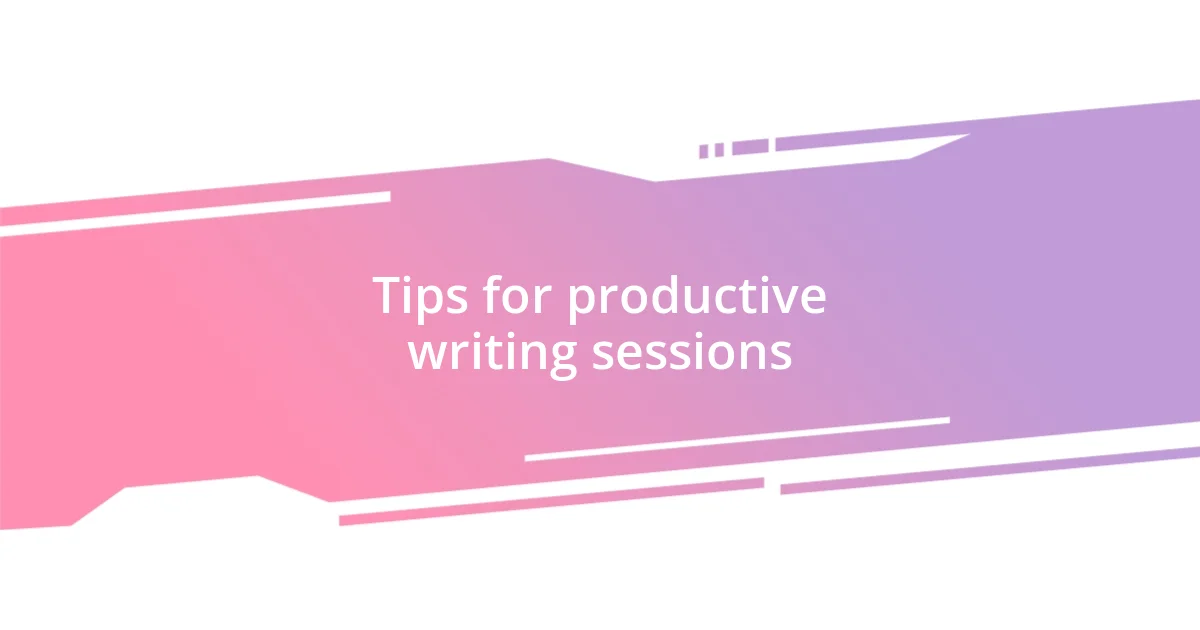
Tips for productive writing sessions
I’ve discovered that setting clear goals for each writing session can make a significant difference. For instance, when I aimed to draft a specific scene or complete a certain word count, I felt a sense of purpose. It’s like laying out a map for a journey—don’t you find it easier to stay on track when you know exactly where you want to go? By breaking down my writing into manageable chunks, I often finished stronger and walked away feeling accomplished.
Creating a distraction-free environment is another tip that has paid off handsomely. I remember one afternoon when I decided to put my phone in another room, and suddenly, my focus sharpened. The quiet allowed me to dive deeper into my narrative without the constant ping of alerts. Have you ever noticed how easy it is to get sidetracked? Establishing a sacred writing space—complete with cozy lighting and my favorite writing playlist—has transformed my sessions. It cultivates an atmosphere where creativity flourishes.
Lastly, I find that incorporating rituals into my writing sessions works wonders. Almost like a little psychological trick, I developed a pre-writing routine where I would brew my favorite tea and take a few moments to breathe deeply. This habit not only signals to my brain that it’s time to write but also calms any pre-session jitters. What little practices do you have that help you get into the right headspace? For me, it’s those comforting rituals that help bridge the gap from daily life into the world of my stories.
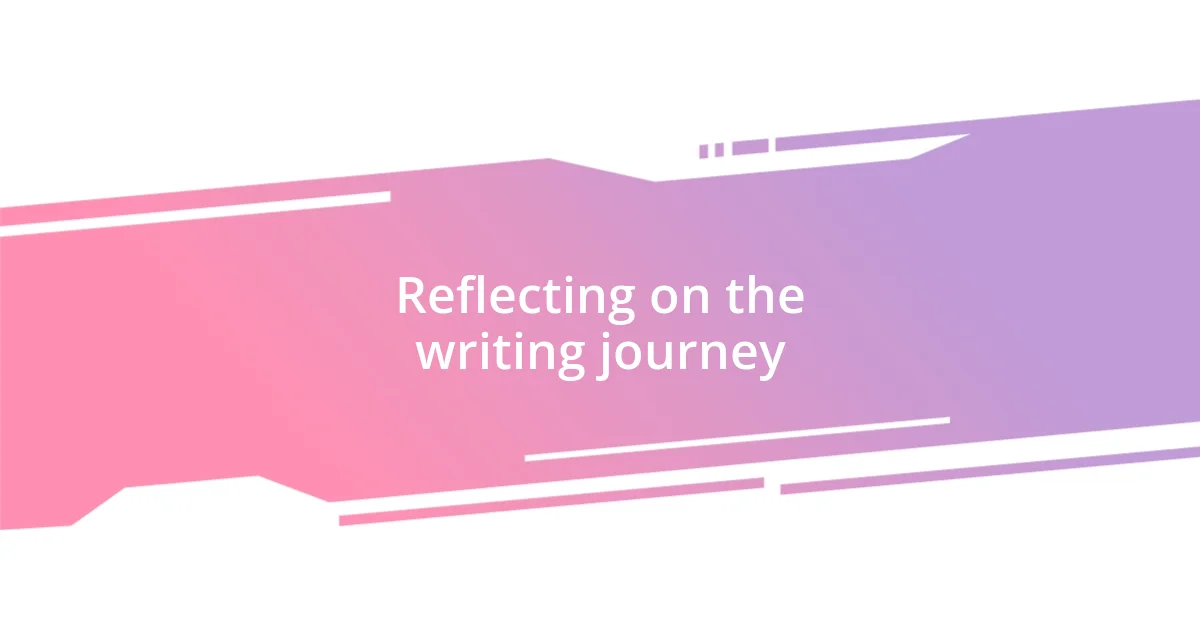
Reflecting on the writing journey
Reflecting on my writing journey often brings a mix of emotions. I vividly recall those late nights spent typing away, fueled by coffee and a sense of urgency. There’s something uniquely fulfilling about watching my story unfold word by word, even when doubt crept in. Have you ever noticed how those moments of uncertainty can prompt the most significant breakthroughs? Looking back, it’s evident that those struggles shaped my narrative in ways I never expected.
Along the way, I discovered that the journey is as important as the destination. I experienced moments of joy that ignited my passion—as well as the frustration that challenged my resolve. It was during a particularly tough week, when I felt stuck, that I decided to step back and revisit my favorite books. Reimmersing myself in those worlds not only reignited my creativity but also provided perspective. How do you find inspiration when you hit a wall? For me, getting lost in others’ stories often serves as a reminder of why I started writing in the first place.
The relationships I built during this journey have been a priceless aspect of my experience. I still cherish the late-night chats with fellow writers about plots and characters, which often turned into therapy sessions. These exchanges were instrumental—they didn’t just help me improve my craft; they reinforced the understanding that every writer faces similar struggles. Have you found comfort in shared experiences? Reflecting on those connections brings warmth to my heart, as they transformed my writing journey from a solitary path into a collaborative adventure filled with endless possibilities.














